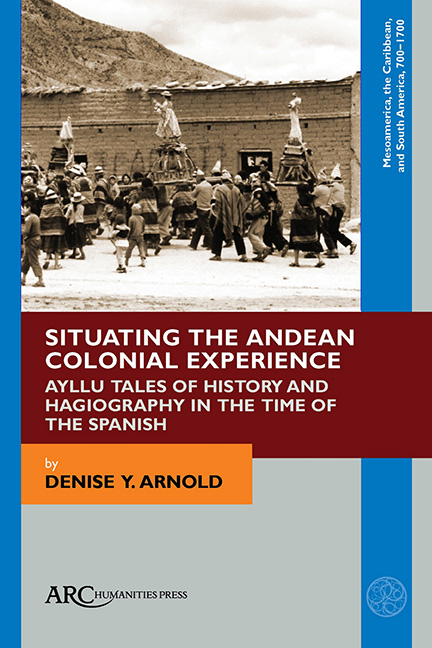 Situating the Andean Colonial Experience
Situating the Andean Colonial Experience Book contents
- Frontmatter
- Contents
- List of Illustrations
- Note About the Spelling of Toponyms and Proper Names
- Acknowledgements
- Maps
- Introduction
- PART ONE THE ORAL HISTORY OF QAQACHAKA
- PART TWO THE COLONIAL CACIQUES IN ORAL AND WRITTEN HISTORY
- PART THREE QAQACHAKA MARKA
- PART FOUR THE SAINTS APPEAR
- PART FIVE THE RELIGIOUS PRACTICES OF QAQACHAKA MARKA
- Some Conclusions
- Glossary
- Appendix A Document C of Don Franco Quispe Maraza
- Appendix B Document K of Don Franco Quispe Maraza
- Bibliography
- Thematic Index
- Index of Toponyms
Chapter 1 - Genesis in Qaqachaka
Published online by Cambridge University Press: 22 June 2021
- Frontmatter
- Contents
- List of Illustrations
- Note About the Spelling of Toponyms and Proper Names
- Acknowledgements
- Maps
- Introduction
- PART ONE THE ORAL HISTORY OF QAQACHAKA
- PART TWO THE COLONIAL CACIQUES IN ORAL AND WRITTEN HISTORY
- PART THREE QAQACHAKA MARKA
- PART FOUR THE SAINTS APPEAR
- PART FIVE THE RELIGIOUS PRACTICES OF QAQACHAKA MARKA
- Some Conclusions
- Glossary
- Appendix A Document C of Don Franco Quispe Maraza
- Appendix B Document K of Don Franco Quispe Maraza
- Bibliography
- Thematic Index
- Index of Toponyms
Summary
We are Adam and Eve, dammit,
we are the Red-Trousered Ant …
Don Enrique Espejo, from Qaqachaka puebloWHEN WE ATTEMPTED to persuade the older people of Qaqachaka to record the “talk of before” (layra parla in Aymara), even before the origins of the place, when there were still no people there, they used to tell us Andean versions of biblical tales. We heard tell of Adam and Eve, the Ascent of Jesus to Heaven, and the Great Flood, the recitation of each tale providing an oral support for the more mythic history of the place.
This general knowledge of biblical tales is the result of centuries of Catholic indoctrination in the region. However, some episodes in these tales referred to the regional memory of the “Chullpa” people who used to live in Qaqachaka in the non-Christian (or pre-Christian) past. In these cases, it was common to have a pause between the narratives to comment on places in the landscape associated with the livelihood of those Chullpa people, their burials also called “chullpas” found on hill tops, and their “chullpa churches” (chullpa injlisa), ancient constructions that would shine at night during the month of August. If people saw these places glow in the twilight, they would immediately throw a knife in that direction, knowing they would find gold.
The Chullpas and the Lord of the Clouds
The local historian and title-bearer Don Franco Quispe Maraza related to us on one occasion his own version of the biblical tale of the Great Flood, a tale told in the whole world, perhaps because it was already known before the Palaeolithic diaspora of diverse migrants from Africa to other continents.
In his version, Don Franco recognizes the Evangelical influence of the predicators who visit the region in the present day, although he personally identifies himself in the tale with the Catholic locals. This influence is expressed in the way Don Franco creates in the narrative an opposition between the Catholic sinner and Lord Noah, the cultural hero of the tale and a part of the Chullpas, with his Aymara nickname of Tata Nuwi, allied to the Evangelists and thus saved from the Flood. Don Franco gives attention in the tale to the languages spoken by the distinct personages. Tata Nuwi speaks Quechua,
- Type
- Chapter
- Information
- Situating the Andean Colonial ExperienceAyllu Tales of History and Hagiography in the Time of the Spanish, pp. 29 - 44Publisher: Amsterdam University PressPrint publication year: 2021


